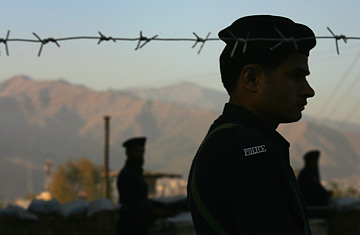
Pakistani police stand vigil in Mingora in the Swat Valley of Pakistan, November 18, 2007
The local police precinct in the village of Matta has a new sign: Taliban Station. The same thing in the village of Kabal — in fact, nine of the twelve districts in the picturesque Swat Valley, 100 miles from Pakistan's capital, have been taken over by militants, who have torched music shops, barred girls from going to school, forced women to wear burqas and decreed that men must grow beards. As if to complete the flashback to Taliban-era Afghanistan, the new overlords have even attempted to blow up centuries-old Buddhist monuments.
But this is not Afghanistan, of course, or even the tribal lands of the frontier provinces. The Swat valley is Pakistan's premier tourist destination, home to its only ski slope and a haven for trout fishing. But it has become increasingly embattled in the face of an anti-government campaign, over the past five months, by the charismatic radio preacher Maulana Fazlullah, known as the FM mullah, who has spawned a wave of fundamentalist militancy that has swept from the Afghan frontier through the lawless tribal areas of Waziristan and into the settled areas far from the border. The government of President General Pervez Musharraf seems unable to do anything about it.
When Musharraf declared emergency rule three weeks ago, he cited the mounting insurgency in Swat as justification. But so far, the only threats he has been able to curb are those of a free press and an independent judiciary. "It's not that the military is unwilling," says a Western military official based in Islamabad, "but is it capable?" Security analysts fear that Pakistan's security forces lack the training, equipment and expertise to tackle the burgeoning domestic extremist insurgency. The West's most important ally in the war on terror is faltering, distracted by the political crisis in the capital and taking heavy losses that sap the morale in its ranks.
This week the military launched an operation to reclaim control of Swat, sending in 15,000 troops, helicopters, tanks and armored vehicles to battle a ragtag army of some 500 militants. The goal is to push them back into their mountain redoubts, far from the civilian population. "We will bottle up as many of them as possible, and then eliminate them," says General Ahmed Shuja Pasha, Director General of Military operations. The army says that hundreds of militants have already been killed. That's a number militant spokesman Sirajuddin, who only has one name, dismisses as "totally rubbish. Only ten of our jihadis have been killed." If past performance in Waziristan, where last month 250 soldiers surrendered to a few dozen militants, is any precedent, numbers alone are not going to win Pakistan's war. In Swat, according to the military, entire villages have been taken over by bands of militants made up, in some cases, of only nine fighters.
